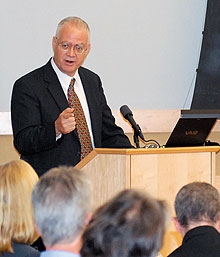  |
| HOME | THIS ISSUE | CALENDAR | GRANTS | BACK ISSUES | < BACK | NEXT > |
Online education expert calls for new approach to teachingby Elizabeth Omara-Otunnu - February 2, 2009
|
||||
| Today’s students are part of a shift from the literary tradition to the virtual tradition and need different skills from those required by previous generations, according to an expert in academic technology. Fedro Zazueta, director of academic technology and online education at the University of Florida, says that to be effective in preparing students as 21st century professionals, faculty must teach differently. “The goal of education is the same: to produce competent individuals who can go out into society and solve the problems of society,” he says, “but because of technology – such as the iPod in the ear 24 hours a day – students are different. Delivery platforms are different, learning skills are different, pedagogy is different.” Zazueta was speaking to a group of faculty and staff during a meeting Jan. 26 that was organized by a newly formed task force on online education at UConn. Doug Cooper, a professor of chemical, materials, and biomolecular engineering and task force co-chair, said the goals of the task force are to understand online education, develop a mission for the University in this area, create a framework, and work with the administration to make it happen. Online education is fundamental to the Academic Plan, Cooper said. It can help the University achieve its goal of being among the nation’s top 20 public universities; help attract high school students; offer community college students a chance to show they are capable of doing well in UConn courses; ease the bottlenecks some undergraduates are experiencing in fulfilling general education requirements; and enable professionals to study for a degree while maintaining their jobs. The task force, co-chaired by Cooper and Desmond McCaffrey, director of instructional design and development, includes a representative of each school and college, including the Graduate School and the Health Center, and the regional campuses. It is scheduled to report to the Provost by April 15. At the University of Florida, Zazueta said, not only is enrollment in online courses growing very rapidly, essentially doubling every couple of years, but the rate of growth is even faster among on-campus students than it is for those participating in distance education. He said most college students today belong to the “Net Generation” – those born after 1982. “They were born into technology. … They can’t conceive of a world without it. … They are collaborative, multi-tasking, non-linear thinkers.” Faculty members, on the other hand, belong to earlier generations. “Most of us are immigrants to technology,” he said. “The way I learned was with a textbook,” said Zazueta, an engineering professor. “I would go sequentially through the material. Today, students create a structure that shifts as they learn more about the subject. Then they fill in the details.”
Zazueta said new information technology calls for a new teaching paradigm: “The tools and technologies used to teach face to face no longer work.” To create learning environments that are effective for today’s students, faculty must focus on pedagogy, he said. “We have to go out to our peers in education and learn from them about best practices.” He recommended that faculty work with instructional designers – education professionals competent in technology – to develop and improve the courses they teach. Zazueta said the University of Florida currently has 16 instructional designers and he has requested more. The university has also dedicated a position to exploring new technologies as they become available. Zazueta said in order to change the approach to teaching at the University of Florida, a goal was set of providing 20 exemplary online courses by this spring. A total of $600,000 was set aside for the development of these courses, and faculty were invited to submit proposals. He said the goal is to identify a community of leaders among the faculty who can be successful and “carry the message” to other faculty. The faculty members whose proposals were selected spent two days at a summer institute, where they received training on the process they would follow to develop the online courses, including the basics of pedagogy. This cut the time for course development by half, he said. Zazueta said research on online education has shown there is no significant difference in the quality of instruction, adding that when the courses are developed specifically for delivery online through the instructional design process, the quality improves. “I believe when faculty engage in instructional design,” he said, “the quality of learning takes a huge leap.” The new courses will be assessed for their effectiveness. University of Florida students are voting with their feet, Zazueta said. Whenever a course is offered both online and face to face, he said, the online section fills within the first 24 hours. |
| ADVANCE HOME |

